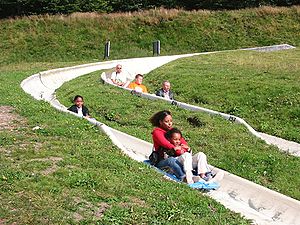This is an old revision of this page, as edited by 207.200.116.10 (talk) at 03:10, 9 November 2006 (→Health). The present address (URL) is a permanent link to this revision, which may differ significantly from the current revision.
Revision as of 03:10, 9 November 2006 by 207.200.116.10 (talk) (→Health)(diff) ← Previous revision | Latest revision (diff) | Newer revision → (diff)
Recreation is the employment of time in a non-profitable way, in many ways also a therapeutic refreshment of one's body or mind. While leisure is more likely a form of entertainment or rest, recreation is active and you are a participant but in a refreshing and diverting manner. As people in the world's wealthier regions lead increasingly sedentary life styles, the need for recreation has grown. The rise of so called active vacations exemplify this.
Recreation, play, and fun are not the preserve of humans; nearly all creatures indulge in this to some extent. Play is essential for the development of skills, the most basic of which are motor skills in young creatures.
The choice of hours for recreation is, for employees, restricted by the requirements of, and agreements with, the employer (working time), and for students restricted by school hours. For people with their own business it is also restricted by the requirements of the work, such as the opening hours of the business based on wishes of customers, laws, and customs.
The weekend is typically a time for recreation, perhaps (in Judeo-Christian and Muslim cultures) because the Sabbath falls on the weekend and the Sabbath is "the day of rest." Holidays are also a common time for recreation. Basically, recreation may take place at any time on any given day. Recreation professionals claim that recreation usually occurs during an individuals discretionary time.
Traditionally music and dance serve as recreation in many cultures, as do sports, hobbies, games (playing) and tourism. Watching TV and listening to music are common forms of recreation, or rather leisure.
Legal restrictions
Some recreational activities are made illegal in many jurisdictions because of the perceived immorality of certain forms of recreation. These include gambling, some forms of sex, drug use or some forms of dancing (such as belly dance). Often one form of an activity is viewed as immoral by a culture while other forms are viewed as acceptable. For example, some forms of sex have been outlawed in certain regions, such as prohibitions against sodomy and nipple tweaking in parts of the United States (though the Supreme Court recently ruled such laws unconstitutional in the Lawrence v. Texas case), while other forms of intercourse are acceptable. Another example is recreational drug use. In most of the world, responsible alcohol consumption, a form of recreational drug use, is legal and acceptable by most people's moral standards. This is probably because alcohol has traditionally been in wide use in Western Europe. Note that nearly all drugs that traditionally have not been widely used in European culture have been deemed illegal in most of the world. This does not typically affect the usage rates for most drugs. However, in much of the Western world, legalization of so-called soft drugs is slowly beginning to be widely accepted.
Health
Some individuals view recreation as largely non-productive, even trivial. Excessive recreation is not considered healthy, and may be labeled as escapism. However, research has shown that recreation contributes to life satisfaction, quality of life, health and wellness, and that the use of recreation as a diversion may have clinical applications to individuals with chronic pain and other health impairments. In some cultures and religions, recreation is encouraged on certain days and discouraged on others. For example, in Judaism, the Sabbath is a day for recreation and relaxation, which has in turn influenced many Christian sects to use the Sabbath for the same purpose. However, some sects interpret the Sabbath to be a day where worship is done in lieu of recreation.
Recreation is essential to the longevity of human beings. It helps humans regian their knee strength and helps them revise. It is roughly the opposite of stress. Today, stress is the number one killer in the United States according to TIME magazine . Stress can lead to a number of ailments, such as hypertension. Recreation faciliates three main aims - Re-creation, Relaxation and Recuperation